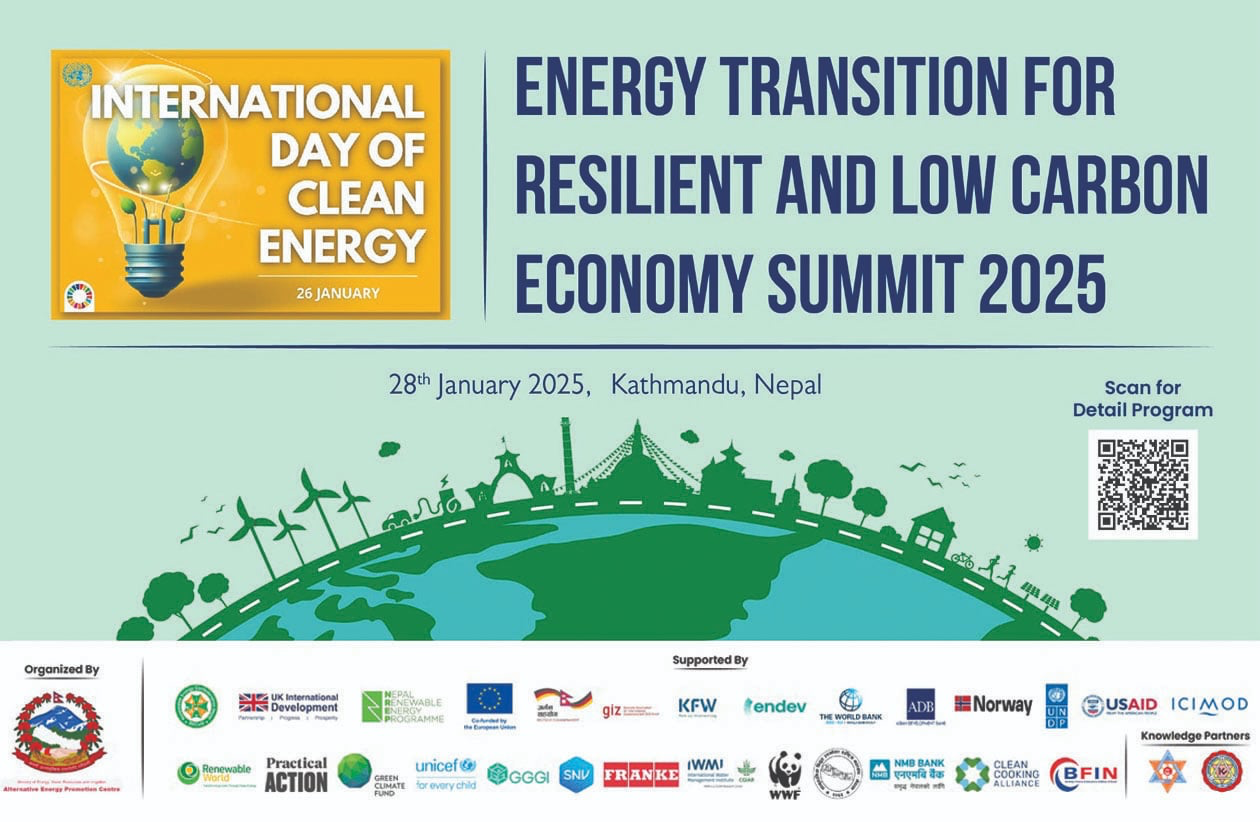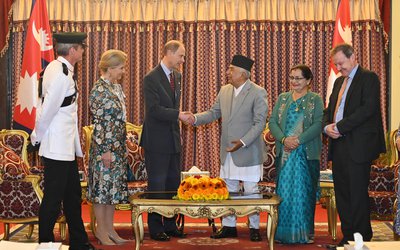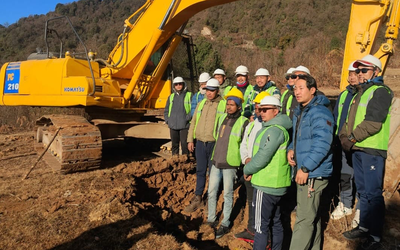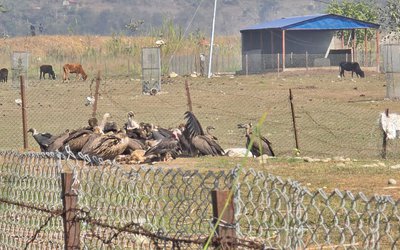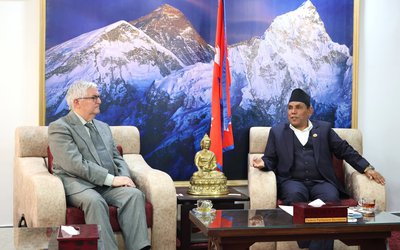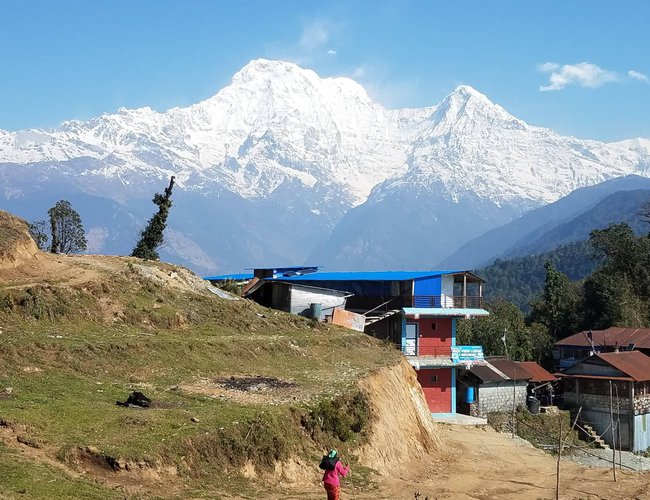
A mountainous country, Nepal, has been long raising its voice in the international forums on the impact of climate change on the Himalayas.
As a result of this, the UN Conference on Climate Change (COP-28) held last year for the first time incorporated in its decision the impact of climate change on the Himalayas and has been emphasizing the effective implementation of the responses to lessen this impact.
In this connection, Nepal is hosting an 'International Dialogue' on May 22 and 23 in Kathmandu to anchor this issue internationally under its own leadership.
Experts from 23 countries are participating in the two-day event that aims to strengthen coordination and prioritize mountain-centric priorities and actions within the broader context of climate change. The theme of the dialogue is, “Mountains, People, and Climate Change”.
More than 200 delegates from the mountainous countries inclusive of Nepal and the island nations, the international community, development partners, international non-governmental organisations, the private sector as well as the representatives of Civil Society will take part in the dialogue.
Joint Secretary at the Ministry of Forests and Environment, Dr Maheshwar Dhakal said that the objective of this dialogue of experts on climate change issues is to prioritize and strengthen in a coordinated way works related to the mountain ecosystem-based climate resilience.
"Climate change is a global agenda and mountainous countries like Nepal have been facing more problems related to it. We have prepared to establish the issue of the adverse impact of climate change on mountainous countries under Nepal's leadership, further internationalizing this topic through the dialogue," he said.
Joint Secretary Dhakal also said the dialogue aims to enhance the negotiating capacity of mountainous countries on climate change and to exert pressure on the international community to mobilize sources required for climate adaptation and reduction of climate change impacts.
"The climate change incidences are increasing day by day. They are comparatively more in the mountainous and hilly regions. Therefore, this International Dialogue will also be useful for raising institutional voice in a stronger manner," he added.
The Chairperson of the UNFCCC Subsidiary Body for Implementation (SBI) and Subsidiary Body for Scientific and Technological Advice (SBSTA) will also attend the dialogue. Similarly, the representatives of the UNFCCC Secretariat and the representatives of UN agencies, the World Bank, the Asian Development Bank and other agencies will also participate in the discussions.
The Dialogue has the goal of forging collaboration among the mountainous countries and the stakeholders in the programmes under the UNFCCC.
Chief of the Ministry's Climate Change Management Division, Joint Secretary Dr Buddhi Sagar Poudel said this conference will help in understanding the issues of climate change impact in the Himalayan region and their solution at a deeper level.
"Our conclusion is that this Dialogue will contribute to integrating the expertise and experiences on the topic and also to develop mountain climate resilience strategy along with common resolve," Poudel added.
Prime Minister Pushpa Kamal Dahal 'Prachanda' is scheduled to inaugurate the Dialogue featuring nine sessions covering three major thematic issues. These sessions will focus on climate change science, mountaineering facts and data, measures for mountaineering resilience based on nature, and the exploration of potential sources and opportunities for the protection of mountain regions.
The Dialogue will delve into the impact of climate change, its crisis and risks, climate change policies for prosperity, climate change adaptation in local leadership, climate change justice, gender equality, and local concerns. Moreover, it will press for the promotion of investment in clean and green energy, climate finance accessibility, and the enhancement of international and regional partnerships to tackle climate change issues.
Dr Popular Gentle, Climate Change and Environment Advisor to Prime Minister Prachanda hopes that the Dialogue will provide a platform to discuss and highlight the impact of climate change and its risks in mountainous regions.
It aims to identify common climate agendas and problems faced by mountain countries, by advocating for the rights of communities residing in or depending on the Himalayan region regarding climate change matters, he added.
The event also aims to minimize the loss caused by climate change in mountain communities' lives and livelihoods by promoting adaptation measures, clean energy, innovations, and research exploration. Capacity enhancement for mountain communities and the promotion of multiparty cooperation and partnership on climate change finance will be stressed.
The Dialogue aims to prepare a substantive roadmap and strategies for the 60th session of the Subsidiary Body for Scientific and Technological Advice and the Body for Implementation (SB 60) of the United Nations Framework Convention on Climate Change (UNFCCC) in Bonn, Germany, scheduled for June 3-13.
The mountain region serves as a primary host for over 15 per cent of the world's population's needs for food, shelter, and clothing, as well as habitats for over 15 per cent of wildlife, including plants. However, mountain countries have been deprived of the expected benefits from this because they have either failed to raise their issues and concerns strongly in international forums or have not received international recognition.
The issue of mountains was accepted by the global community for the first time at the Dubai Conference. The COP-28 held in Dubai, United Arab Emirates from November 30 to December 12 decided for the first time about the climate crisis surfacing in the mountainous region. The conference instructed to organize an "expert dialogue on mountains, humans and climate change" at the 60th meeting of UNFCCC's "SBSTA" to be held in June.
Ever since the COP-15 in Copenhagen, Denmark in 2009, the effect of climate change on the Himalayan ecosystem has been drawing the world's attention. In most of the conferences since then, Nepal has been raising the issue of the Himalayas with a high priority, but relatively little has been achieved in this regard. The Secretary General of the United Nations, Antonio Guterres, mentioned Nepal's name at the opening ceremony of the COP-28, mentioning the impact on the mountains due to the increase in global temperature.
The secretary-general also visited the Everest and Annapurna base area last November on the eve of the conference. His visit also made it easier for Nepal to raise the issue of the Himalayas in the global arena. Under the leadership of Prime Minister Prachanda, Nepal organized a high-level round-table meeting for the first time with the presentation of the issue of mountain regions in the COP-28.
According to the Paris Agreement, the world community has agreed not to allow the temperature of the earth to rise above 1.5 degrees Celsius by the end of this century. It is estimated that before 2050, the temperature of the Himalayan region will exceed 1.8 degrees Celsius. The increase in temperature has increased the risk of melting two-thirds of the glaciers of the mountains in this region.
Analyzing the data of the previous decade, the temperature in the mountains is increasing at a ratio of 0.05 degrees Celsius per decade. With the increase in temperature, the melting of glaciers is also increasing. Its direct impact is from the ecosystem of the Himalayan region to the island nation.
Due to the increase in temperature during the period from 1980 to 2010, the area of the glacier has decreased by 25 per cent. According to the International Centre for Integrated Mountain Development (ICIMOD), there are currently 2,700 glaciers in Nepal and 21 of them are at risk, while 25 glaciers in the Autonomous Region of China and one in India are at risk.
- Enough Stock Of Passport For A Year: DoP DG Aryal
- Feb 05, 2025
- Weather Forecast: Geneally Cloudy To Mainly Fair
- Feb 05, 2025
- Duke and Duchess of Edinburgh Nepal Visit: Valuing Shared History And The Next Generation of Nepal –UK Friendship
- Feb 04, 2025
- Duke and Duchess of Edinburgh arrive in Kathmandu on 6-day Royal visit
- Feb 04, 2025
- FNCCI, CNI And NCC Call For Withdraw The Protest Against Cable Car Construction
- Feb 04, 2025
